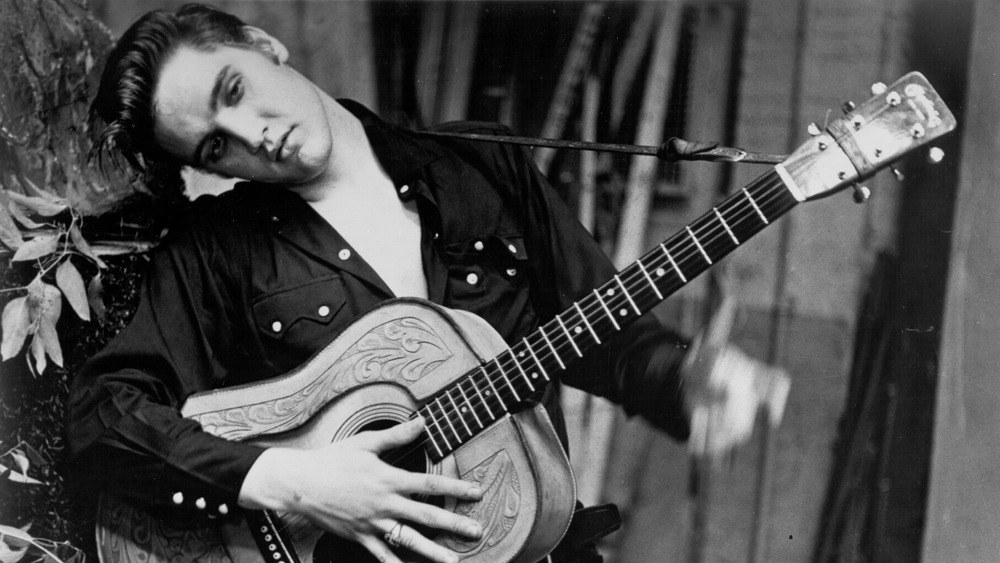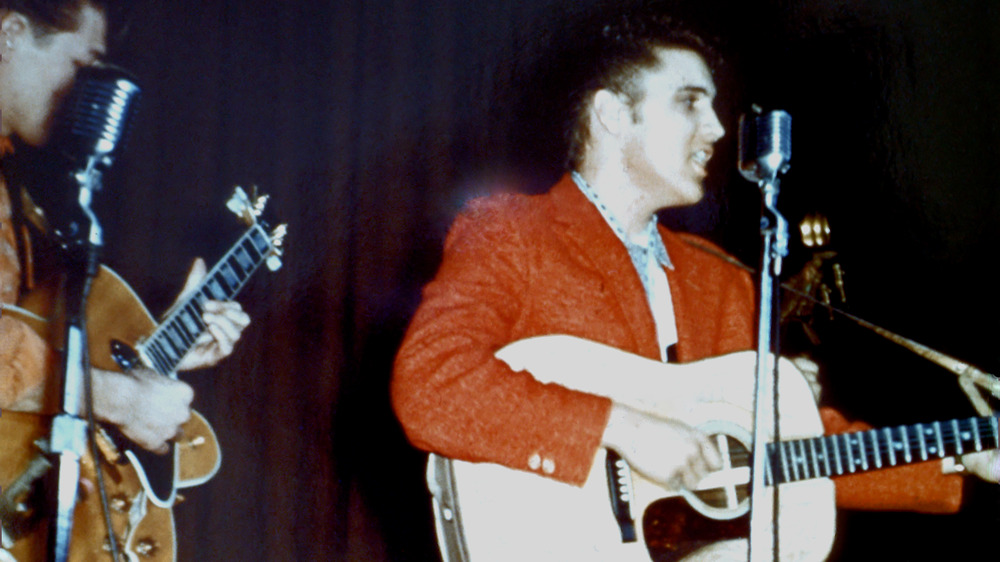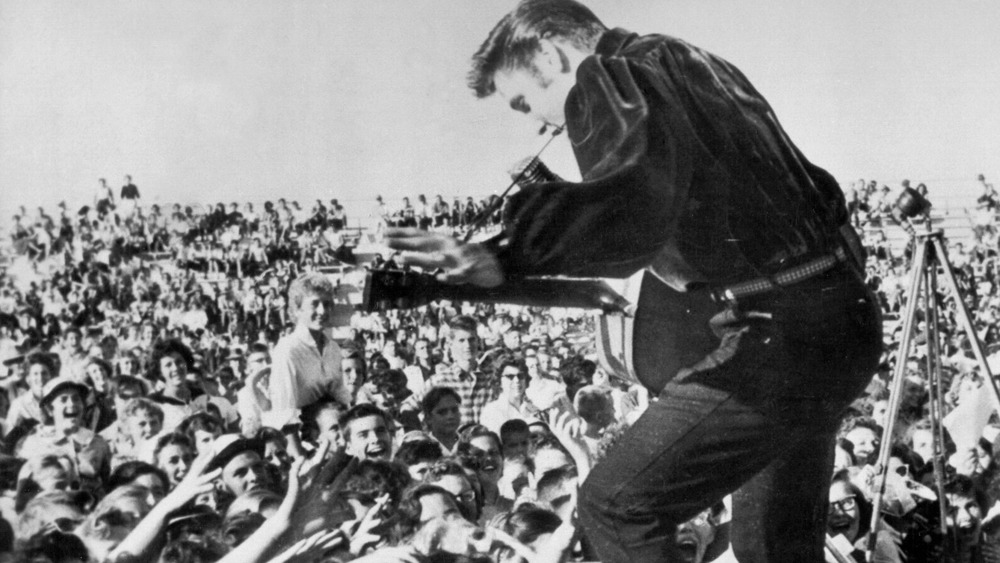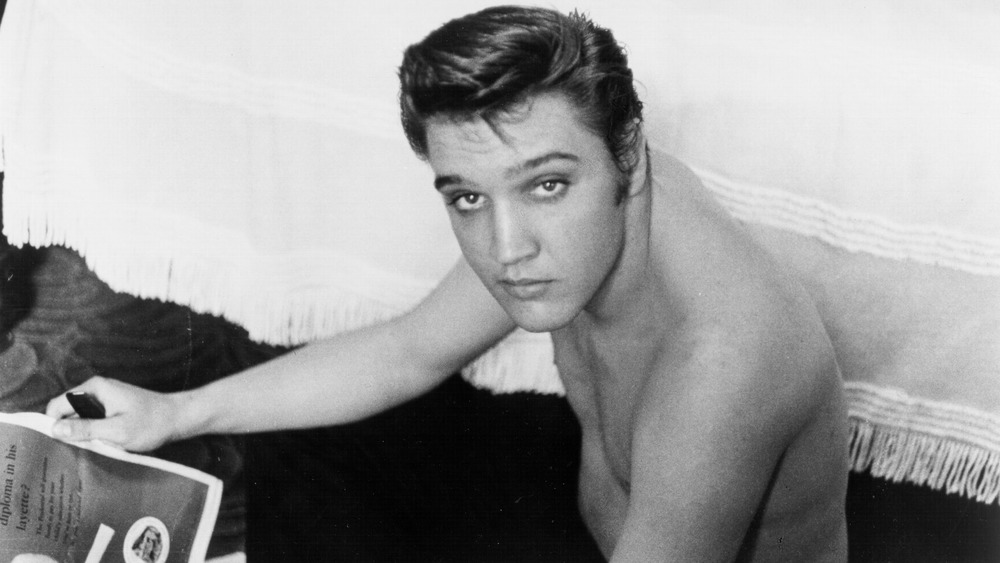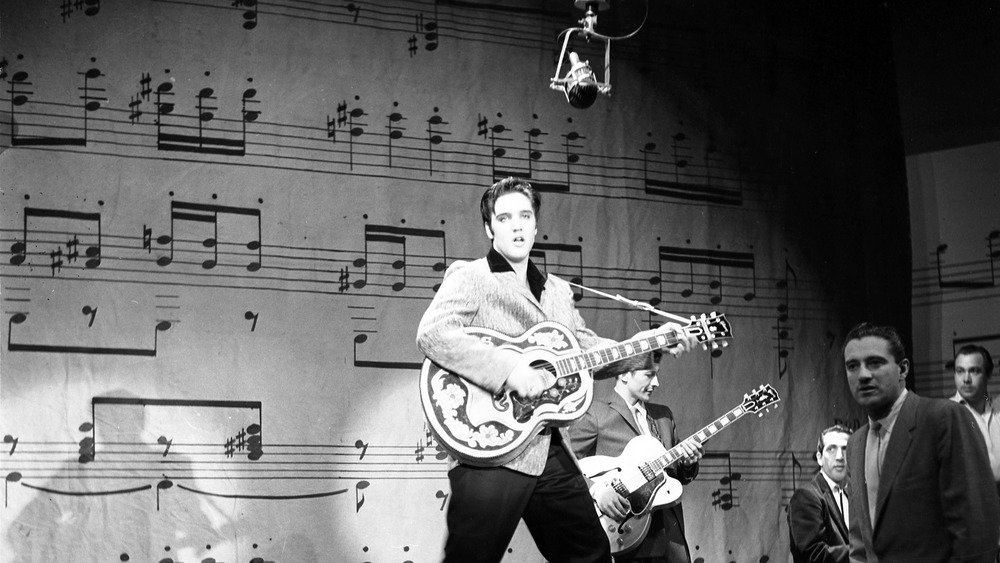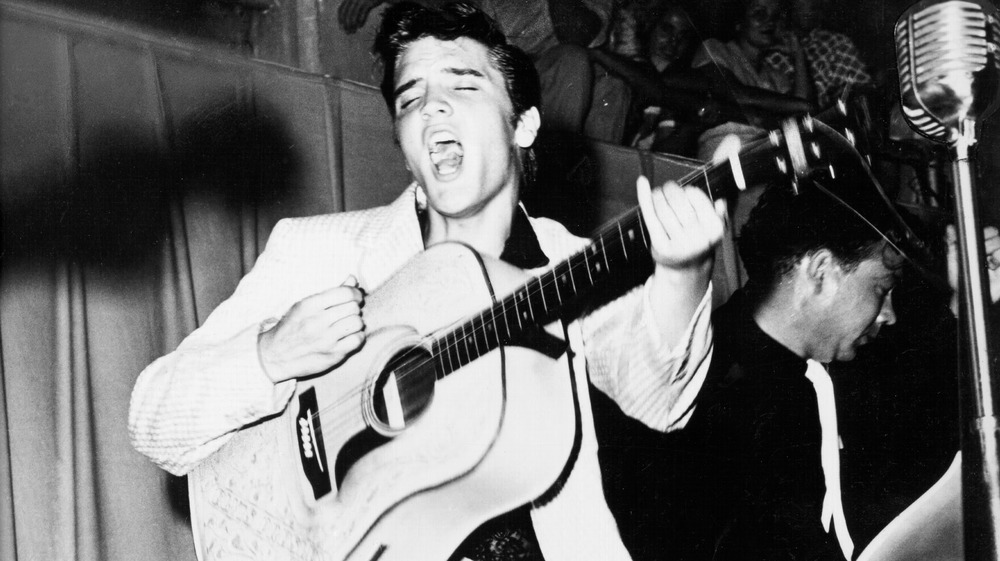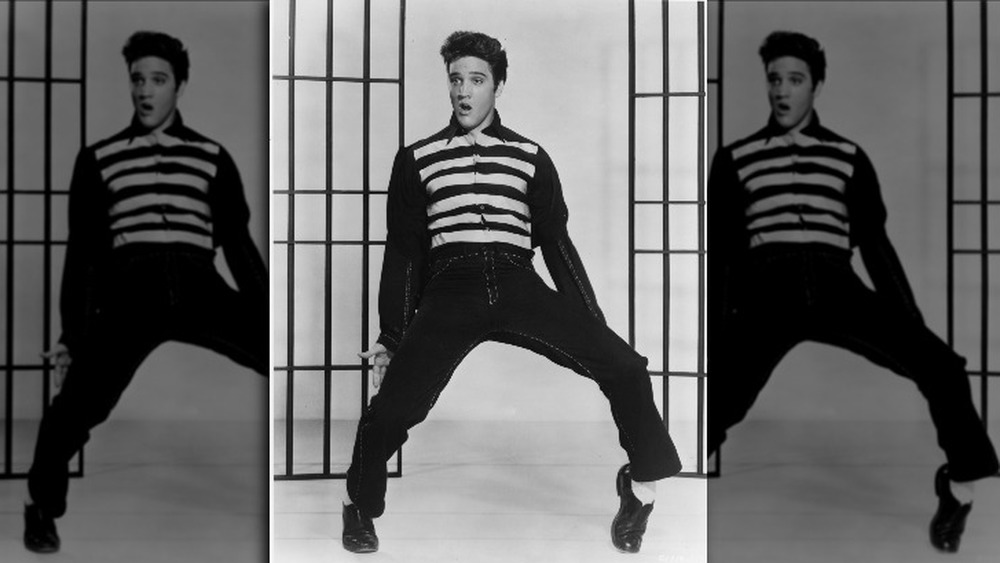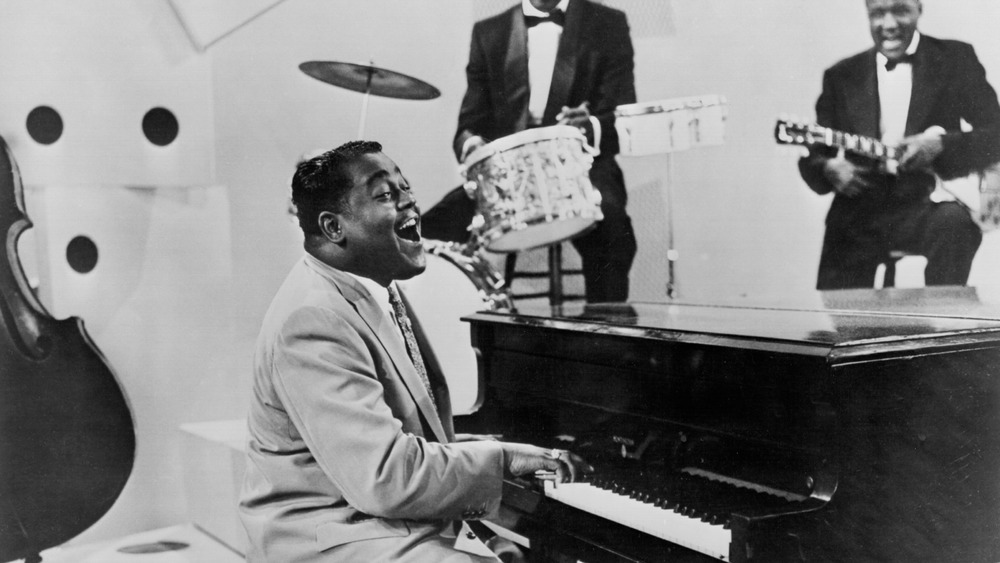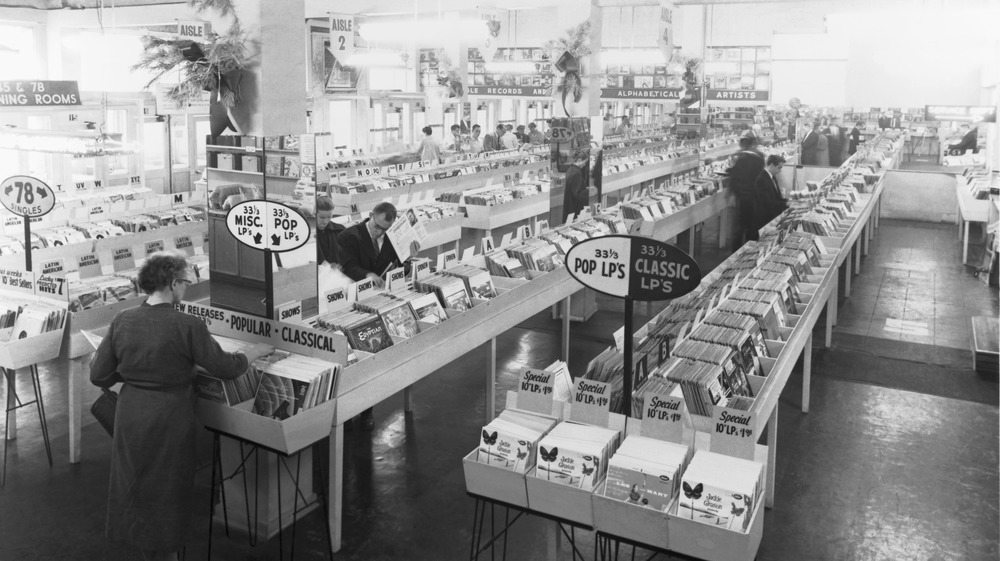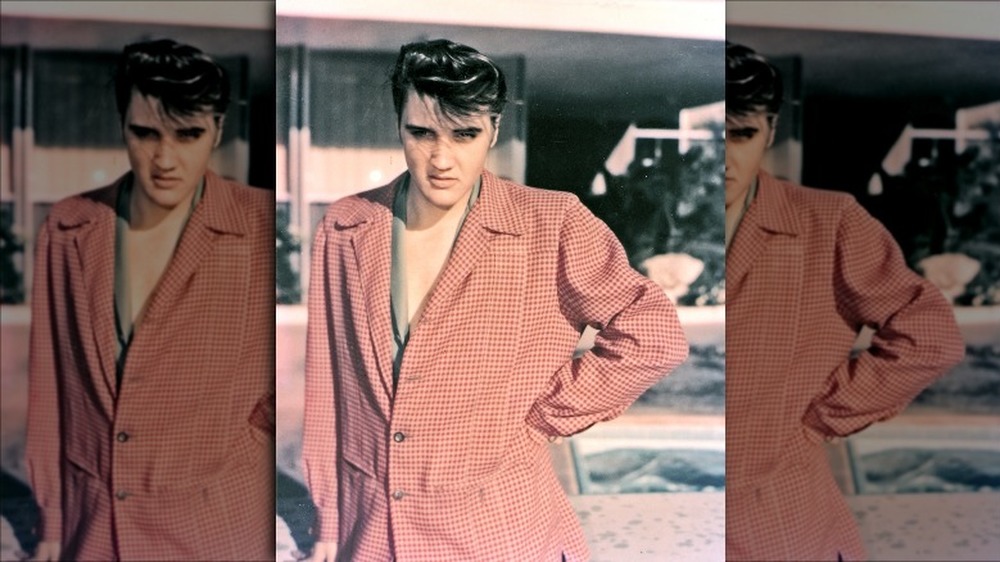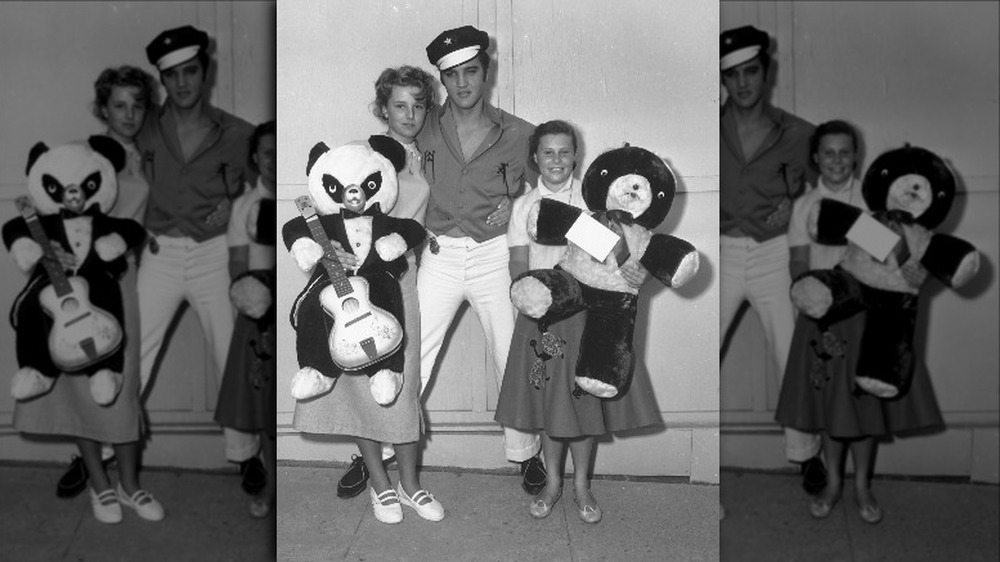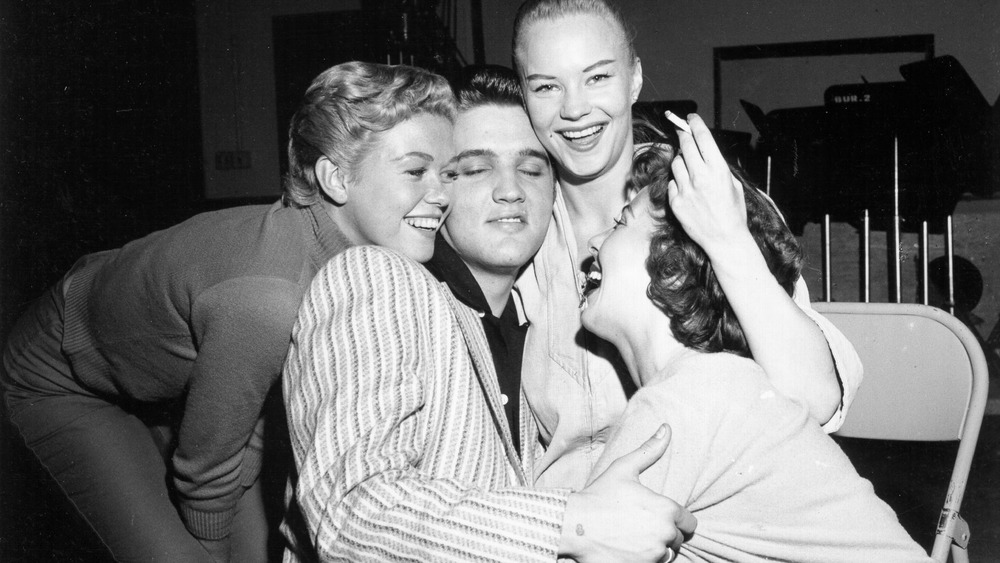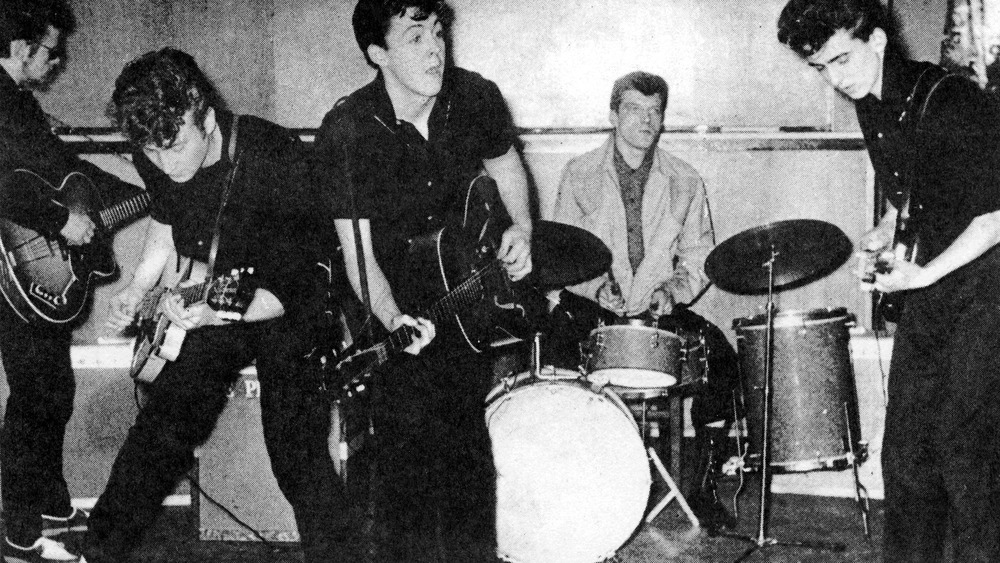What It Was Really Like To Be An Elvis Presley Fan In The 1950s
Even after decades, Elvis Presley—known to many as the King of Rock & Roll, or simply "The King"—still has a profound impact on popular culture as we know it today. His ascent into superstardom in the 1950s was one that America had never seen of before, and one that was only made possible by his fervently devoted fans. Amidst the norms of conservative etiquette and manners, Elvis fans threw away their inhibitions to scream and dance freely, mass buy records, and turn up the energy at sold-out shows in a way no one had ever seen before.
Fans of Elvis were arguably one of the first iterations of what we see as typical youthful fandom behavior today. But as with anything new and unfamiliar, there was backlash and dark sides. For every unforgettable concert, there was a ruthless review condemning Elvis and his fans for moral corruption and delinquency. And for every time a mob of fans crowded tore his clothes off, there was probably an unsuspecting fan who fell prey to Elvis' own advances. Here's what it was really like to be an Elvis Presley fan in the 1950s.
Some fans saw Elvis perform at their very own high schools
While Elvis Presley is widely considered an icon of the 1950s, "the King" didn't actually hit national stardom until the second half of the decade, after some prominent appearances on television in 1956. According to The Pop History Dig, before those appearances, Elvis was much more of a "regional phenomenon." Constantly on the road to promote his music, the musician had a grueling tour schedule in the early 1950s, performing in a new Southern town almost every night for months on end. Those early fans who were paying attention to the rising Memphis musician may have been lucky enough to see him at their very own school auditoriums or county fairs. A list of his 1955 performances included humble venues such as "South Side Elementary School, Bastrop, LA" or "Texas High School, Seymour, TX."
Despite the smaller venues and the fact that he was often the support act to larger artists, it was Elvis's energetic performances that left audiences in a frenzy. Ardys Bell Clawson, a fan who saw Elvis perform four times, recalls his first Jacksonville performance where he was opening for Hank Snow's Country and Western Jamboree: "He wasn't top dog...but when he sang, the girls went nuts."
Introducing the screaming fans
Nowadays, having a legion of screaming fans is expected of any famous pop star. But before Elvis hopped on the scene, things were apparently different. Before "The King" made his debut, the last icons that captured the hearts of American women were crooners like Frank Sinatra and Bing Crosby, according to Time. But while these balladeers' intimate performances might have had girls swooning, audience reactions still mostly included respectful cheering and applause. It wasn't until Elvis, with his gyrating and husky voice, that the phenomenon of hysterically screaming fans began to be observed, as described by Alan Hanson, author of several Elvis books.
The first time Elvis drew that kind of reaction from the crowd, he was shocked: "I was scared stiff...Everyone was hollering, and I didn't know what they were hollering at." To be fair, some in the audience might not have known either. In a collection of quotes from fans who had attended a 1956 show, a few mentioned that they started screaming just because everyone else was: "I honestly did not know why people were so excited, but I knew I'd better act like I was too, so I...did my best to imitate the screams with hands to my heart and hair and arms waving the air." In fact, deafening screams that "never stopped the entire show" was a key point mentioned throughout everyone's recollection. Another common theme? How exhilarating and unforgettable it was to attend an Elvis performance in the fifties.
Some fans literally ripped Elvis' clothes off of him once
The love and fervor that Elvis ignited in his fans sometimes led him to be physically mobbed. Once during a performance in Jacksonville, in his classic flirty way, Elvis invited the crowd backstage after the show, as described by Jacksonville Magazine. Whether he was joking or not was of no concern to the hundreds of overenthusiastic fans, who subsequently charged forward past security, mobbed their idol in his dressing room, and literally tore his clothes off his body, according to the book Elvis and Gladys.
Such reactions were witnessed in horror several times by Elvis' mother, Gladys, whose own protective instincts jumped in one time when her son performed at a high school in Mississippi. At that show, Gladys apparently clawed through and confronted the mob of fans, furiously asking them, "Why are you trying to kill my boy?"
Amazingly, Elvis was rather unbothered by the chaos that tended to ensue around him. In a 1956 interview, he talked about that "Presley riot" in Jacksonville: "Shucks, they were only tearing my clothes. I didn't mind a bit." It is perhaps this nonchalance, this easy acceptance of wild adoration, that reinforced fans' affections and strengthened his long-lasting star power.
The magic of television helped turn millions into Elvis fans
One of the most important, life-changing years of Elvis Presley's life was in the mid-fifties: 1956, to be exact. That was the year that Elvis went from being a rising rock & roll musician to the biggest star in the United States. And it was all put in motion by the magic of television. According to the official Graceland website, by the mid-50s, television had infiltrated almost every family home in America, turning it into a tool of "mass culture." With only one set in a house and a handful of channels, viewership was highly concentrated, with singular TV programs having the attention of a majority of the population in the country. One legendary program that was wildly popular? The Ed Sullivan Show.
Initially, Ed Sullivan had no plans to have Elvis on his show, as described by History. His was a family show after all, and there seemed to be nothing family-friendly about Elvis and his gyrating hips. But after the singer brought in huge ratings for competitor programs like The Steve Allen Show earlier that year, Sullivan finally let up on the Presley ban and invited him for three appearances in late 1956. His first appearance was seen by 60 million people, or 82.6 percent of TV viewers, and shot him straight to the top. As Andrew Solt declares, "Elvis on Ed Sullivan was the original Big Bang of rock 'n roll...Overnight, popular culture was upended."
For the youth, Elvis embodied their sense of rebellion
According to Andrew Solt in an interview for the official Graceland website, a post-World War II, 1950s America had a sleepy character. Without war looming over everyone's head, much of society had settled down calmly. But for some, calm also means boring. This seemed to be especially true for middle-class teenagers who had been too young during the war to appreciate the serenity of their lives in the 1950s. When Elvis burst onto the scene, American teens were the first to latch on to who they saw as a breath of fresh air, a symbol of the non-traditional. As suggested by Solt, the rock & roll star represented their sense of "brewing rebellion."
As described by Time, there was so much about Elvis that was at odds with the norms of middle-class white America. For one, he sang traditional African American rhythm & blues music, not only embracing the style but praising and crediting Black artists during a time when Jim Crow was the law of the land. He also moved on stage in a sexually suggestive manner that was in direct violation of the purity values imposed by the churches. On top of all that, he was a poor Southern boy who at times was unrefined in his speech and mannerisms. All in all, Elvis was everything parents, preachers, and authority figures would have hated, but in classic youth rebellion, that just made him all the more popular.
'Corrupted' by Elvis
As it is with many artists, huge fame often comes with equally strong criticism. Fans of Elvis in the 1950s likely had to deal with those around them, especially older adults, vehemently disapproving of the controversial rock & roll star. While his fans would scream and faint at the sight of his shaking hips, others were horrified at the vulgarity. According to Rolling Stone, churches and religious organizations condemned his moves as lewd and protested the corruption of the youth. Parents saw him and rock & roll as instigators of disobedience and "juvenile delinquency."
These strong opinions sometimes came with extreme actions. Fans in Nashville and St. Louis were probably horrified when crowds in their towns "burned and hanged Elvis in effigy" after his second appearance on The Ed Sullivan Show, as told by History. In fact, violence seemed to be a not so uncommon reaction to Elvis' popularity. Author Alan Hanson compiled several occasions where the press published scathing opinions of what Elvis' fans deserved, which included "a solid slap across the mouth," their teeth kicked in, and some time in the "woodshed."
Toeing the racial divide
Whether they knew it or not, Elvis fans were part of a cultural shift in race relations. This stemmed from the fact that Elvis was a white man who popularized what was traditionally a Black genre of music. In some ways, his effect on segregated America could be seen as positive. Elvis often made it clear to his audience that Black musicians should be credited for the music he performed. According to Newsweek, he once clarified, "A lot of people seem to think I started this business. But rock 'n' roll was here a long time before I came along. Nobody can sing that kind of music like [Black] people. Let's face it: I can't sing like Fats Domino can." As a white man, Elvis made rock & roll palatable to a wider audience, which opened new opportunities for the pioneering Black artists that were barred from the mainstream. Additionally, Rolling Stone describes how before "Elvis, Chuck, and Little Richard," segregated shows were strictly enforced but, as rock & roll started dominating, audiences of both races began to dance together.
Of course, whether a love of Black music can be tied to genuine respect for the Black community has always been dubious. In fact, Elvis' legacy is often criticized as a result of audiences' persistent preference for whiteness. As The Grio touches on, while Elvis himself may have honored the Black artists who came before him, it's unclear whether his fans paid the same respects.
In post-WWII America, teenagers finally had money to buy music
With seven No. 1 Hits and an additional 18 Top Ten Hits on the Billboard Hot 100, it's fair to say that Elvis sold quite a few records in his time. According to the book The Fifties (via Brain Pickings), what made Elvis slightly different than the hitmakers that came before him was who was buying his music. For Elvis, the big demographic that loved him were middle-class teenagers, but that would have meant nothing if those teens didn't have the disposable income to mass buy records and sell out shows. Elvis fans in the fifties, as part of a new post-World War II society that was experiencing "rare broad-based middle-class prosperity," were part of a new generation where teenagers had significant disposable income. Whereas in earlier years any money they made would go to helping the family or saving up slowly for a dream purchase, these kids now had the cash to spend on their own interests.
And for many, those interests included music. Record players and radios were now more affordable than before and shopkeepers even started introducing credit buying to the new youth consumer. For teenage Elvis fans, marketing campaigns for records and Elvis merchandise were designed just for them. According to Variety in 1956, "The campaign is unprecedented in that it is the first all-out merchandising drive aimed at teenagers, who have their own money to spend."
Both fans and the masses were influenced by Elvis' style
Through his later appearances and the prominent impersonators that linger around Las Vegas, Elvis may be best known today for his outlandish and iconic jumpsuits. In the 1950s, though, at the start of his ascent, his style was much more understated, yet no less impactful on the impressionable legion of fans that he had. In a collection of quotes from fans who remembered seeing him in 1956, Joe W. Crow, who was 17-years-old at the time, recalls how "everyone wanted to be like him, imitate him; sing his songs; try to do hair like his and dress like him; even doing his famous moves."
While his style in the fifties may not be as memorable as his later bedazzled jumpsuits, Elvis still managed to start quite a few trends that decade. According to Hal Lansky (via Paste Magazine), whose father Bernard was one of Elvis' chief stylists, Elvis started wearing pink at a time when it was considered a shade "real men" never touched. Eventually, the color became huge in the 1950s, including on clothing, Cadillacs, and lawn flamingos. Additionally, the "rockabilly" look he often sported soon became a defining image of the decade. Designer Joe Casely-Hayford (via Esquire) describes Elvis's role in fashion as being "at the forefront in defining a new anti-establishment visual language."
Fans were encouraged to organize and form clubs
Since his debut in the fifties, Elvis Presley fans would band together to form official fan clubs. According to the official Graceland website, these fan groups would actually be encouraged and officially recognized by Elvis' management team. Colonel Parker, the prominent businessman behind the star's rise, and his office would actually engage a grassroots promotional strategy by working in tandem with these local fan clubs to promote "upcoming album releases and performances in their area."
While some informal clubs may have involved a couple of friends coming together in the name for their love of "the King," official fan clubs were run like legitimate organizations, with founders, leaders, and registered members. Clubs were formed all over the world, even in countries that Elvis had never even performed in. One such club was The Official Elvis Presley Fan Club of Great Britain and the Commonwealth. As described by Harry Carrigan, the OEPFC grew so big (over 7,000 members) that the founders actually quit their jobs and ran it as a business in late 1958. As a member, you'd get official membership cards, badges, newsletters, photos, special items, and more.
Exploiting his own fans
According to the book Elvis Presley: A Southern Life (via Vice), Elvis Presley had a history of taking advantage of his fans' adoration for him, particularly in the form of preying on underage girls. Such instances include having a group of 14-year-olds with him on tour that would "pillow fight, tickle, wrestle, and kiss Elvis, who was 22 at the time." Many of his girlfriends were in fact underage, such as 15-year-old Dixie Locke, who Elvis dated when he was 19. He also would subsequently cheat on her with fans while he was on tour.
These reports show a pattern, especially when one considers Elvis' relationship with his only wife, Priscilla. Elvis, who was 24-years-old at the time, met and began a relationship with 14-year-old Priscilla in 1959. While it would take another eight years before they got married, the relationship is just one indicator of Elvis' predatory ways.
Future stars in the Elvis fan club
Being a fan of Elvis in the 1950s would have put you among some notable company. Countless musical legends have mentioned being a fan of Elvis, often citing him as one of the main reasons they got into music. Cher, at the age of 11-years-old, went to an Elvis show as her very first concert, a fact that was presented at the "Icons: The Influence of Elvis Exhibit" (via Moody Blue). "Even at that age he made me realize the tremendous effect a performer could have on an audience," she has said.
Another recognizable name? Bruce Springsteen, who was six-years-old when he saw Elvis first perform in 1956 on The Ed Sullivan Show, as described to NJArts. In 1978, Springsteen declared, "Everything starts and ends with Elvis." And of course, his impact wasn't limited to the States. Across the pond, in Liverpool, England, members of The Beatles were inspired by Elvis, with the star's influence clearly visible in their early styles and on-stage mannerisms. According to History, John Lennon once declared, "Nothing affected me until I heard Elvis. Without Elvis, there would be no Beatles."
